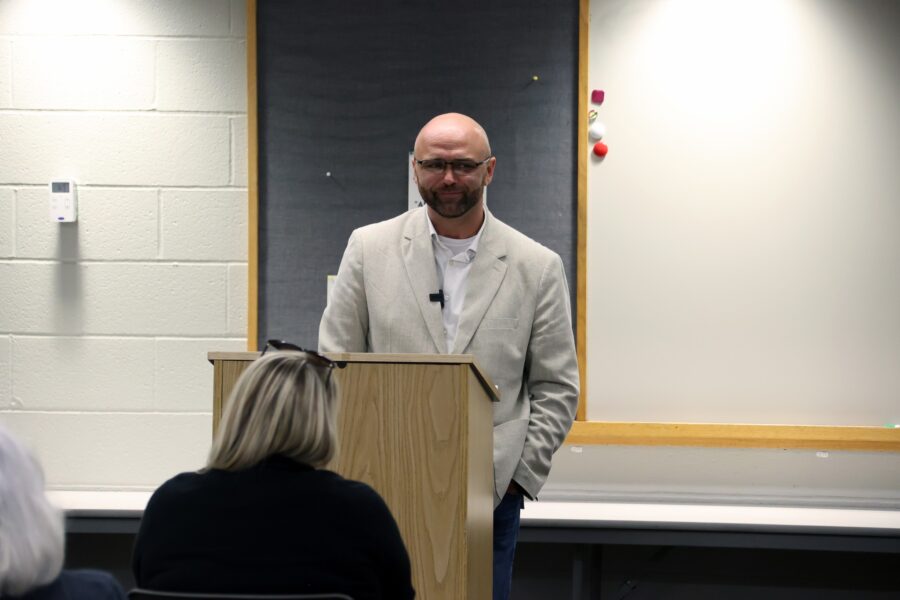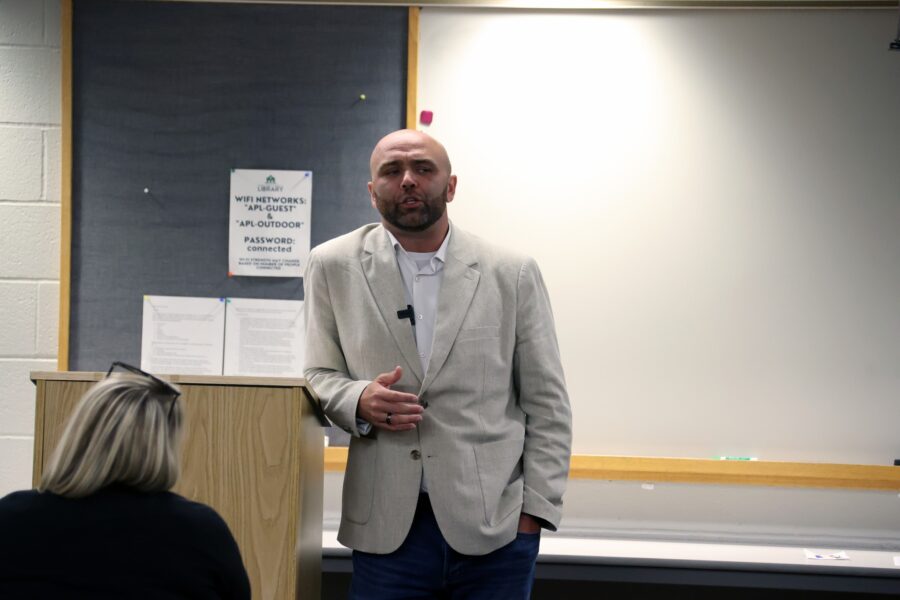“Walk Me Home”: Author Randy Spade Opens His Heart on Loss, Healing, and the Power of Talking About Suicide
ASHLAND — On Tuesday evening, the Stockwell Room at the Ashland Public Library was nearly full as people quietly took their seats. There was a heaviness in the air, a knowing silence, as they prepared to hear local author Randy Spade share something many in the room had experienced but few had ever spoken aloud: the pain of losing a loved one to suicide.
For nearly an hour, Spade did more than read from his book Walk Me Home. He opened his heart, raw and unfiltered, taking listeners on a journey through some of the darkest valleys of his life.
Spade began by acknowledging the difficult subject. “It’s arguably one of the worst topics to talk about,” he said softly. “And yet, it’s exactly the one that needs to be talked about.”
His book was born out of unbearable loss—twice. In 2011, while still in college in Kentucky, he received the devastating call that his Aunt Angie—who had raised him like a mother—had died by suicide following the death of her husband.
“I can still remember that moment like the whole world came apart and collapsed on top of me,” Spade recalled. “I was broken and suffocated at the same time.”
Seven years later, in 2018, tragedy struck again. His younger brother Wesley also died by suicide. Spade admitted that while he thought he might know how to handle a second loss, the pain was just as crushing—different, but equally devastating.
“You think if it happens again you’ll know what to do. That’s not true,” he told the audience. “Each relationship, each person, each loss—carries its own weight, its own web of heartbreak.”
For Spade, the only way forward was to write. What began as personal notes, poured out in grief, eventually became Walk Me Home. Sixteen drafts later, whittled down with the help of friends and editors, it became a book that he describes not as a how-to guide, but as a companion for survivors.
“I couldn’t go back in time. I couldn’t fix anything. But I could create something that might sit with people the way I needed someone to sit with me,” he said. “Pick it up when you need to. Put it down when you can’t. Come back to it later. Let it walk you home.”
The title reflects that image of journeying through grief—not moving on, but moving through. “When I lost Angie, and then Wesley, I felt like I was lost in the wilderness. Not at sea, not floating. Lost in the woods. And I couldn’t find my way,” he said. “This book is about helping people walk back toward life, one step at a time.”
Perhaps the most passionate moment of the evening came when Spade challenged the stigma around suicide.
“For years, people told me, ‘Don’t talk about it. If you talk about suicide, more people will die.’ That’s a myth,” he said firmly. “We’re not talking about it—and people are still dying. Silence doesn’t save lives. Conversation does.”
His words struck a chord in a county where suicide deaths have been rising, mirroring a national trend. In 2023, Ashland County recorded double-digit suicides for the first time in nearly a decade. Nationally, 49,000 Americans died by suicide that year.
“That’s 49,000 beautiful people,” Spade said, his voice breaking. “And 49,000 families left behind, wondering what they could have done differently, questioning everything. I say enough. I’m done with silence. I refuse to shut up about it.”

Even in grief, Spade refuses to let his loved ones be defined by their final moments.
“Angie was the glue of our family. She was a writer. She was the one you could count on,” he said. “Wesley was outgoing, full of life, with dreams ahead of him. They’re not statistics. They are love, laughter, stories, memories. That’s how I want them remembered.”
Through tears and humor—sometimes making lighthearted, “inappropriate” jokes the way his grief support group once did—he reminded the audience that survivors deserve to laugh again, to feel joy again.
“You deserve to be happy,” he said. “If your loved one was special, they would want that for you. Don’t let anyone tell you differently.”
Spade honors Angie and Wesley in small and large ways—through raising his children, whose names carry echoes of their memory; through pilgrimages to their favorite spots like Mount Jeez; through every small act of kindness he now dedicates to them.
“I don’t want anyone to ever feel the unbearable weight of being alone,” he said. “If I can stop that once, or a thousand times, then their memory lives on.”
And that, he insists, is how survivors transform grief into legacy. “Our loved ones were more than their last moment. Every time we tell their story, every time we do something kind in their name, they live on.”
The evening closed with Spade reading passages from Walk Me Home—haunting, beautiful lines about grief’s weight, and hopeful ones about choosing to live with love. He ended with a quote from poet Mary Oliver: “Tell me, what is it you plan to do with your one wild and precious life?”
For Spade, the answer is clear: “To live a life that honors their memory. To create a legacy of love, connection, and compassion that will outlast me.”
The audience, many of whom were no doubt connecting with everything Spade was saying and feeling, For an hour, strangers had become companions on the same long road of grief, bound by a conversation too important to remain unspoken.
For those who walk the long road of surviving suicide loss, his message is simple and urgent:
“Stay. Just a little longer. You don’t have to have the answers today. You are not alone. And if you can’t carry hope right now, let someone else hold it for you until you can again.”











